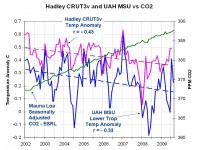By Syun-Ichi Akasofu, Community Perspective on Newsminer.com
Recent studies by the Hadley Climate Research Center (UK), the Japan Meteorological Agency, the National Oceanic and Atmospheric Administration, the University of East Anglia (UK) and the University of Alabama Huntsville show clearly that the rising trend of global average temperature stopped in 2000-2001. Further, NASA data shows that warming in the southern hemisphere has stopped, and that ocean temperatures also have stopped rising.

See larger image here
The global average temperature had been rising until about 2000-2001. The International Panel for Climate Change (IPCC) and many scientists hypothesize rising temperatures were mostly caused by the greenhouse effect of carbon dioxide (CO2), and they predicted further temperature increases after 2000. It was natural to assume that CO2 was responsible for the rise, because CO2 molecules in the atmosphere tend to reflect back the infrared radiation to the ground, preventing cooling (the greenhouse effect) and also because CO2 concentrations have been rapidly increasing since 1946. But, this hypothesis on the cause of global warming is just one of several.
Unfortunately, many scientists appear to forget that weather and climate also are controlled by nature, as we witness weather changes every day and climate changes in longer terms. During the last several years, I have suggested that it is important to identify the natural effects and subtract them from the temperature changes. Only then can we be sure of the man-made contributions. This suggestion brought me the dubious honor of being designated “Alaska’s most famous climate change skeptic.”
The stopping of the rise in global average temperature after 2000-2001 indicates that the hypothesis and prediction made by the IPCC need serious revision. I have been suggesting during the last several years that there are at least two natural components that cause long-term climate changes. The first is the recovery (namely, warming) from the Little Ice Age, which occured approximately 1800-1850. The other is what we call the multi-decadal oscillation. In the recent past, this component had a positive gradient (warming) from 1910 to 1940, a negative gradient (cooling - many Fairbanksans remember the very cold winters in the 1960s) from 1940 to 1975, and then again a positive gradient (warming - many Fairbanksans have enjoyed the comfortable winters of the last few decades or so) from 1975 to about 2000. The multi-decadal oscillation peaked around 2000, and a negative trend began at that time. The second component has a large amplitude and can overwhelm the first, and I believe that this is the reason for the stopping of the temperature rise. Since CO2 has only a positive effect, the new trend indicates that natural changes are greater than the CO2 effect, as I have stated during the last several years.
Future changes in global temperature depend on the combination of both the recovery from the Little Ice Age (positive) and the multi-decadal oscillation (both positive and negative). We have an urgent need to learn more about these natural changes to aid us in predicting future changes. See more here.
Syun-Ichi Akasofu is a former director of the Geophysical Institute and the International Arctic Research Center, both on the campus of the University of Alaska Fairbanks




